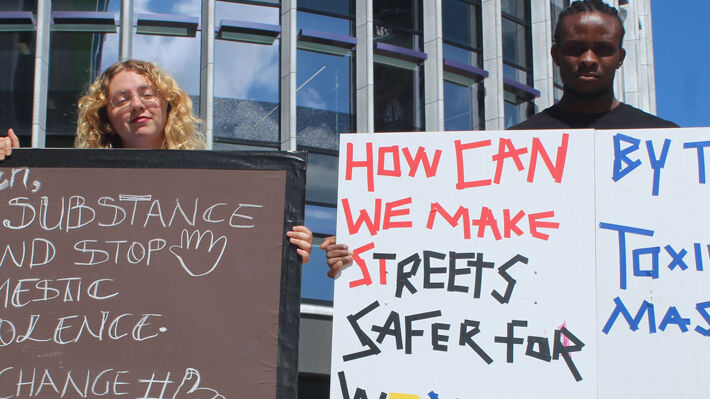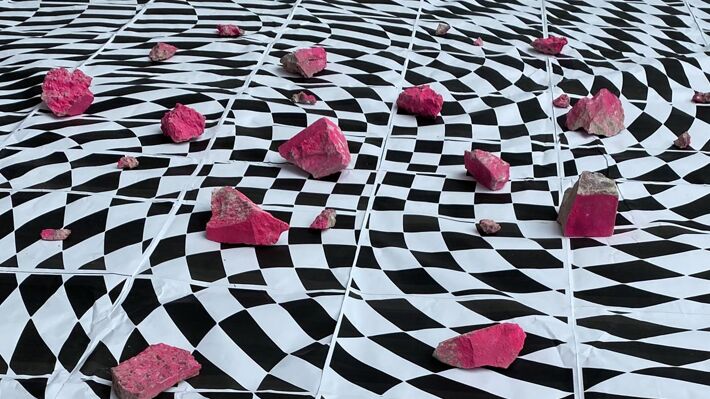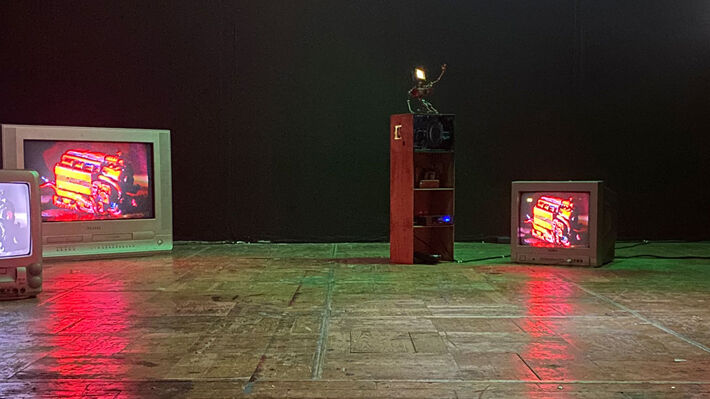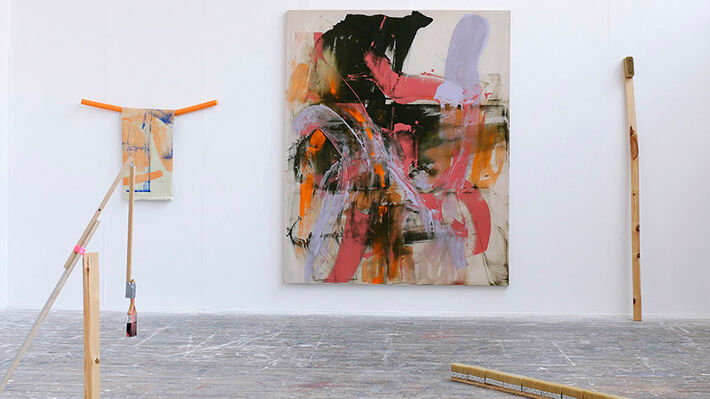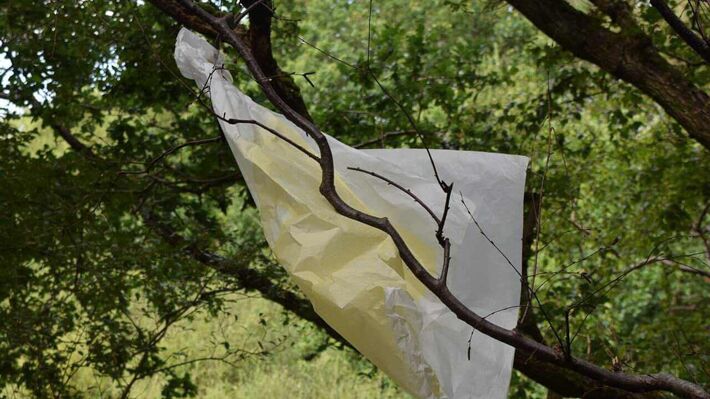Fine Art - MA
Currently viewing course to start in 2026/27 Entry.
Embark on a transformative journey with our MA Fine Art program, where contemporary practice is considered in relation to art histories, philosophies, theory, and the global....
- Level Postgraduate Taught
- Study mode Full Time/Part Time
- Award MA
- Start date September 2026
- Fees View course fees
- Subject
- Location Margaret Street
This course is:
Available with Professional Placement option
Open to International Students
Overview
Financial awards are available for this course. Find out more and apply now
Embark on a transformative journey with our MA Fine Art program, where contemporary practice is considered in relation to art histories, philosophies, theory, and the global.
Based in the vibrant city of Birmingham, MA Fine Art brings together a diverse community of international creative visual thinkers and makers with the aim of cultivating innovative, imaginative, and self-reflexive approaches to making contemporary art. Our course encourages a plurality of visions based on individual, proposal-led study, whilst encouraging a range of media exploration.
From drawing, painting and print, to sculpture, digital media and performance, our program allows you to experiment with a variety of artistic techniques and develop your unique voice through analogue and digital processes.
Whilst on the postgraduate program you will explore relevant themes & develop professional strategies, delving into the material, political, cultural, and theoretical factors shaping contemporary fine art. You'll gain hands-on experience in professional production, advanced research methods, contextual understanding and effective dissemination of your work.
You will build connections and expand your horizons by immersing yourself in a creative learning environment that nurtures collaboration within the art discipline and beyond. You will be encouraged to engage with the exciting Birmingham art scene and connect with wider art ecologies, preparing you for a confident future in the creative industries.
What's covered in this course?
During the course you will have expert guidance and learn from a dedicated team of experienced academics, researchers, artists, and technicians who will mentor you throughout your journey.
The transformatory energy of the course is best expressed in the words of one of our students: "My MA in Fine Art enabled me the time and space to reach a new level of critical engagement with my practice. Continual discussion with my peers from a diverse range of disciplines pushed my work into new territories and encouraged crucial challenges that gave rise to bold developments. The MA was a perfect opportunity to experiment, question, and take risks essential to the progression of a substantial and enriched practice." – Betsy Bradley
During your time with us you will study at the historic Birmingham School of Art (Margaret Street Campus), an extraordinary, Grade-1 listed arts and crafts building, and be part of a vibrant postgraduate community. Birmingham School of Art was part of a revolutionary movement to make art available to all, as the UK’s first art school run by a town council. We continue to be inspired by this legacy and its commitment to making fine art education inclusive.
Our alumni have been successful in diverse sectors such as education, the cultural industries, and arts organizations in both the public and private sectors, demonstrating the level of preparation offered to support continued practice or to work in a variety of creative art professions.
Alumni are artists, academics, researchers, have founded creative project and gallery spaces, and have worked in national and international arts and educational organisations.
Professional Placement option
This course offers an optional professional placement. This allows you to spend 20 weeks with an employer, following completion of your taught modules, and is a great way to enhance your employability.
The experience you gain through your placement will allow you to evidence your professional skills, attitudes and behaviours at the point of entry to the postgraduate job market.
If you choose the placement option, you will be responsible for finding and securing a suitable placement to complement your chosen area of study. You will be able to draw on the University’s extensive network of local, regional and national employers, and the support of our Careers teams. If you do not secure a suitable placement, you will automatically be transferred back to the standard, non-placement version of the course.
Please note: Placements will only be confirmed following a competitive, employer-led selection process. As such, the University will not be able to guarantee placements for students who have registered for the professional placement option.
The MA Fine Art course created a challenging and stimulating environment which allowed me to re-evaluate and contextualise my practice. The course helped me to acquire the knowledge, skills and experience needed to realise my potential ambitions and to find my unique voice as an artist. The programme is run with professionalism at its core and has prepared me well for the future.
Samira Nejad, MA Fine Art
Why Choose Us?
- Birmingham School of Art is an internationally recognised centre of excellence for art-based learning and research.
- The MA Fine Art programme has a significant international reputation with alumni in over 20 countries worldwide, with strong exhibition profiles and working in a range of institutions and organisations.
- Each year the MA Fine Art course participates in an Inter-Institutional Symposium with a select number of other MA Fine Art courses throughout the UK.
- You will be supported by a highly professional staff team, doctoral researchers, technical demonstrators and artists in residence in a caring and supportive environment.
- We have good external links with internationally recognised galleries (Ikon, BMAG, Tate) and organisations in the creative industries (ELIA) and the wider community. Our graduates have shown work in renowned galleries (including Tate Modern) and at prestigious events (such as the Venice Biennale).
- A high number of graduates have been awarded fully funded Arts and Humanities Research Council and Birmingham City University Scholarships for PHD study.
Similar Courses
OPEN DAY
Join us for an Open Day where you'll be able to learn about this course in detail, chat to students, explore our campus and tour accommodation.
Next Event: 15 November 2025
Entry Requirements
Essential requirements
Applicants are normally expected to have a minimum of a 2:2 honours degree, or equivalent, in Fine Art, Art and Design, or another Arts-based subject.
We also welcome applications from individuals who may not satisfy the normal entry requirements, but have equivalent professional or life experience.
Applicants will also need to submit a good portfolio.
Applying with international qualifications
See below for further information on applying as an international student.
If you have a qualification that is not listed, please contact us.
Fees & How to Apply
UK students
Annual and modular tuition fees shown are applicable to the first year of study. The University reserves the right to increase fees for subsequent years of study in line with increases in inflation (capped at 5%) or to reflect changes in Government funding policies or changes agreed by Parliament. View fees for continuing students.
Award: MA
Starting: Sep 2026
- Mode
- Duration
- Fees
- Full Time
- 1 year
- £9,510 in 2026/27
- Full Time
- 18 months (including Professional Placement)
- £10,460 in 2026/27
- Part Time
- 2 years
- Show fees
- £1057 per 20 credits
- Year 1 - 120 credits
- Year 2 - 60 credits
Fees for Part-time students
This course can be studied on a Part-time study basis. The cost per year of study is based on credit requirements for that year.
International students
Annual and modular tuition fees shown are applicable to the first year of study. The University reserves the right to increase fees for subsequent years of study in line with increases in inflation (capped at 5%) or to reflect changes in Government funding policies or changes agreed by Parliament. View fees for continuing students.
Award: MA
Starting: Sep 2026
- Mode
- Duration
- Fees
- Full Time
- 1 year
- £18,970 in 2026/27
- Full Time
- 18 months (including Professional Placement)
- £20,865 in 2026/27
Portfolio guidance
If you receive an offer to study this course, you will be required to submit a portfolio. We ask that this is submitted within four weeks of receiving your offer.
Please see our portfolio guidance page for tips on putting your portfolio together.
Portfolio guidance
If you receive an offer to study this course, you will be required to submit a portfolio. We ask that this is submitted within four weeks of receiving your offer.
Please see our portfolio guidance page for tips on putting your portfolio together.
Personal statement
You’ll need to submit a personal statement as part of your application for this course. This will need to highlight your passion for postgraduate study – and your chosen course – as well as your personal skills and experience, academic success, and any other factors that will support your application for further study.
If you are applying for a stand alone module, please include the title of the module you want to study in your Personal Statement.
Not sure what to include? We’re here to help – take a look at our top tips for writing personal statements and download our free postgraduate personal statement guide for further advice and examples from real students.
Course in Depth
Modules
In order to complete this course you must successfully complete all the following CORE modules (totalling 160 credits):
This module is self-directed by you, and you will establish the practical and contextual parameters of the work to be undertaken by submitting a study proposal. The module encourages you to develop your individual and/or collaborative arts practice in whatever form it takes, in relation to the development of your theoretical and/or contextual research. In the first instance it is anticipated that you will reorientate your practice and that this will be moved forward through imaginative practical experimentation, and research into contemporary art practices, philosophical, and transcultural contexts.
This module introduces you to creative research methods and methodologies used in arts and design production. The focus here is on research through practice, where practice itself serves a research purpose. Through the analyses and synthesis of appropriate research tools you will deepen understanding of your own work, whilst querying what it is you might research and how you might achieve your aim.
This module advances the speculative and experimental nature of art making and is self-directed by you, building on the previous practical and contextual parameters of your work. The module encourages you to further extend and deepen the integration of practical artistic development with theoretical and contextual research.
You will develop your work through imaginative, inter-disciplinary and technical experimentation, and focused research into contemporary art practices and related theories and cultures. There is the opportunity to problem solve and manage the development of practical skills in a range of media and/or related disciplines where relevant to your work.
The purpose of this module is to enable you to undertake a sustained, in-depth and theoretically informed research project exploring an area that is of personal interest to you. The outcome may take the form of a written dissertation/ practical outcome with accompanying reflective, critical and contextual material or negotiated equivalent.
In order to complete this course you must successfully complete at least 20 credits from the following indicative list of OPTIONAL modules.
Central to this experience is a 70-hour work placement, which you can complete either in a concentrated block or spread out over the duration of the module. During this placement, you’ll have the opportunity to develop your professional attributes and subject-specific skills. To closely align with real-world job market conditions, you should expect to prepare a current and relevant CV, attend interviews, conduct research in order to source your own placement.
Support will be available from academic staff and the ADM Careers+ service to assist you in securing your placement.
This module provides an opportunity for you to apply your knowledge and skills to an external, professional brief. The brief will be ‘real’, set in negotiation with an external client/agency/community, or it may be a simulation, inspired by a typical professional scenario you might experience in a work situation. The brief will enable you to apply your discipline-specific skills broadly, collaborating with your fellow students and, where relevant, across disciplines and with other stakeholders.
Creative careers often lead individuals on unexpected journeys, traversing diverse paths. Recognizing and seizing opportunities becomes pivotal in shaping a fulfilling portfolio career - one that harnesses your creative abilities while sustaining your livelihood. Whether you’re crafting artistic artifacts, performing, providing services, or offering consultancy, the art of promoting and pitching ideas lies at the heart of an independent, entrepreneurial journey.
Core modules are guaranteed to run. Optional modules will vary from year to year and the published list is indicative only.
Professional Placement
In order to qualify for the award of MA Fine Art with Professional Placement, a student must successfully complete all of the Level 7 modules listed above as well as the following Level 6 module:
This module is designed to provide you with the opportunity to undertake a credit bearing, 20-week Professional Placement as an integral part of your Master’s Degree.
The purpose of the Professional Placement is to improve your employability skills which will, through the placement experience, allow you to evidence your professional skills, attitudes and behaviours at the point of entry to the postgraduate job market. Furthermore, by completing the Professional Placement, you will be able to develop and enhance your understanding of the professional work environment, relevant to your chosen field of study, and reflect critically on your own professional skills development within the workplace.
Download course specification
Download nowCourse structure
The course comprises of five modules, taken over a one year full-time or two-year part-time route.
Learning strategies include:
- Independent learning
- One to one tutorial support
- Group tutorials
- Taught staff led seminars
- Student led seminars
- School of Art Public Talks Series
- Lectures and conferences
- Library research/resources
- Field trips (where appropriate)
Classroom activities and projects
The staff team is highly professional with extensive expertise within their individual specialist subjects and fields of research. As an MA Fine Art student, you will also have access to visiting professionals working in the art world.
Teaching throughout this course reflects the dynamic and current interests of the year group. Alongside this, students are supported in the independent investigation within their artmaking, in relation to a critical, theoretical and contextual frame.
You will be involved in group tutorials and student-led seminars that invite you to present your research and practical work for the group to consider and critically evaluate. The intention here is to share your ideas with other people who become ‘critical friends’ to help you think through your work in new ways.
Throughout the course, students are encouraged to make public exhibitions and events, and seek opportunities to test and to showcase work. There is a fantastic opportunity to show your work by contributing to an Interim Show and the Masters Final Exhibition. Our students have a reputation for being ambitious and year on year, our shows are exciting and thought provoking. As a result of the final shows numerous students have gone on to establish their profiles internationally.
Student stories
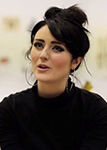
Grace Williams
Grace is an artist and lecturer, currently based at De Montfort University. After her graduation from the MA Fine Art course she became the Gertrude Aston Bowater award holder for practice-led PhD research working toward the thesis 'The Supernatural Sex: Women, Magick & Mediumship: Assembling a Field of Fascination in Contemporary Art'.
Traversing photography, film and installation her work explores the performance and sexual politics of the female body within the fields of Mediumship (channeling conduits) Magick (Occult, black magic), Magic (vanishing women) and pre-narrative cinema; with a specific focus on the materialising mediums within the Thomas Glendenning Hamilton photographic archive, for which she received the T.G Hamilton research Grant from the University of Manitoba, Canada.
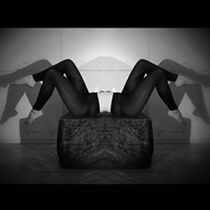
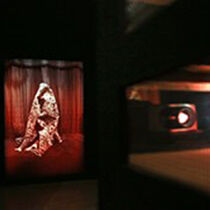
Images: Escamotage / After Cecil Beaton
Ning-Hsin Chang (Losa Cola)
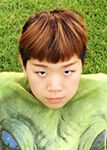
Losa is a sculptor, installation artist and poet. Her work is concerned with the experience of women in Taiwan and the expectation of traditional gender roles that she works to subvert in a nuanced way through the creation of anthropomorphic post-human creatures and partial body parts. Her work uses a range of material but most commonly involves the use of clay, wax, fabric, text and sound.
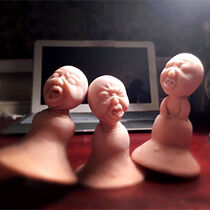
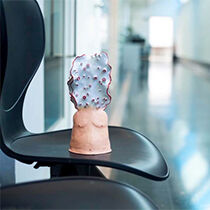
Images: Strange Attractors (2016) / Untitled Creature (2016)
Employability
Enhancing employability skills
As you study this course you will develop a set of transferrable skills such as creative problem solving, communication and presentation skills, adaptability and flexibility, independence and teamwork, and good time management.
You will also learn technical and digital skills in a range of workshop practices linked to your individual development.
Links to Industry
The College has a wide array of links with partner organisations regionally, nationally and internationally. These partnerships will provide work experience opportunities for you, and contribute to your learning and teaching activities.
Regional - Birmingham Museum and Art Gallery, Ikon Gallery, Eastside Projects, Coventry Biennial, Midlands Art Centre, New Gallery Walsall, Mead Gallery, VIVID, Capsule, Grand Union, Stryx, Hippodrome, the REP, the new Library of Birmingham, Primary and Secondary Schools across the region.
National - Arts Council England, Tate Britain, Tate Modern, Tate Liverpool etc.
Placements
Placements are one of the possible ways of fulfilling your Research in Practice module. There is scope for placements with a number of organisations in the city and beyond, however it is your responsibility to plan and organise your placement with the organisation you wish to work with.
Placements can last for a few weeks or for a longer period of time. They provide you with a great opportunity to gain insight into how an organisation works and your reflection on their activities can be useful to them as you develop your research. You will also find that this is a great way to meet and network with people in the creative industries. Our members of staff are able to guide and support you through this process.
Our alumni
Hannah Honeywill
Hannah employs objects that already exist, in particular furniture, as it has a history and functionality. Her research has been heavily influenced by the ideas and concepts within queer theory. It is the play, history, silliness and the absurdity of queer methodologies that is present in her artwork.
She was selected for New Art West Midlands, 2016 and shortlisted for the Broomhill National Sculpture Prize, 2016. In 2015 her artwork was long-listed for the Aesthetica Art Prize and she won the Next Wave Prize in Birmingham in 2014. Her work was selected for the Art Laguna Prize in Venice in 2012 and the Threadneedle Prize in London in 2011.
Recent exhibitions have included:
- Barber Institute Residency 2016-2017
- Wellcome Trust Arts Grant 2015 -2016
- Pete Lloyd Lewis Studio Award 2015-2016
Feng Ru Lee - Winner of the prestigious Taipei Prize in 2000
Feng-Ru Lee’s practice is rooted in her Far-East Asian Cultural background her work crosses a range of different media and often-incorporates video, two dimensional works, performance and installation. Toying with ideas of mass production and genetic engineering, Lee’s practice is often seen as both a critique and an attempt to understand the seemingly controversial issues involved in the state of the contemporary human condition. Lee explores ideas that centre on the status of the transition/ migration between cultures and humanity, whilst also addressing notions of the materialisation of objects and beings. Subjects, such as Eastern philosophy and Western science that seem immediately differential, hold intrinsically deep and thought provoking issues for both the artist and viewer. Lee has exhibited throughout the UK, Taiwan and internationally including the USA, Middle East, Japan, and across Europe. In 2001 she represented Taipei, Taiwan in an artist residency programme between Taipei and Jerusalem. Lee has also completed residencies in Berlin and recently at the New Art Gallery Walsall.
Recent exhibitions have included:
- Venice Biennale, 2015
- Flux Fest at VIVID, Birmingham,
- Jam: Cultural Congestions in Contemporary Asian Art at South Hills Park
- Shift Time - The Festival of Ideas in Shrewsbury
- Solo Exhibition at Entrance Gallery in Prague, Czech Republic.
Facilities & Staff
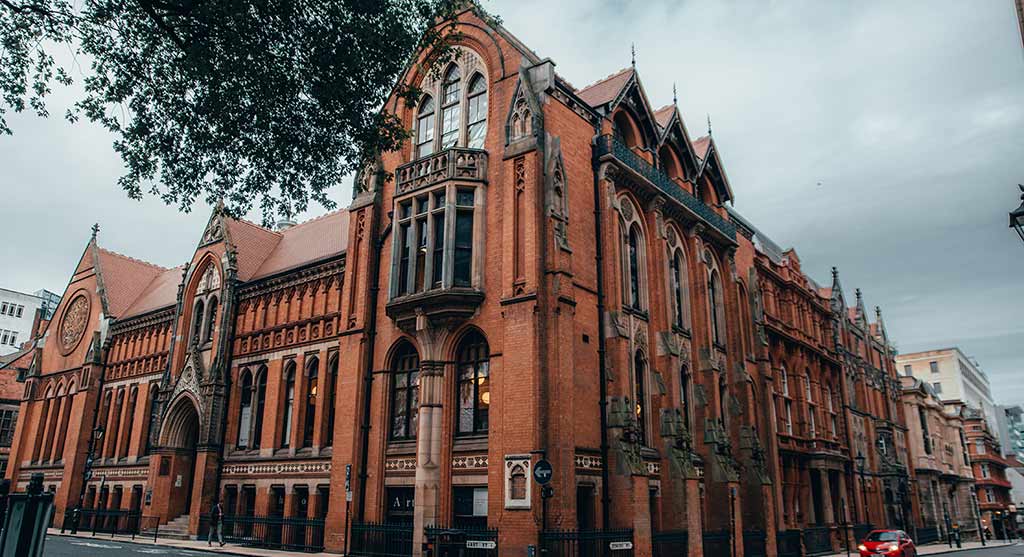
Our Facilities
We are constantly investing in our estate and are currently in the process of spending over £400 million on new learning facilities.
Birmingham School of Art (an impressive purpose built Grade 1 listed example of Venetian Gothic architecture) was the first major renovation project undertaken by the university (£5.5m refurbishment). The School provides an incredible resource for the production of art and its associated fields of study. The building has a range of facilities available including studios, workshops, specialist art and design library, bookable spaces and lecture/seminar rooms.
Our staff
Mona Casey
Course Leader: MA Fine Art
Mona Casey is MA Fine Art Course Director and International Lead. She is also module leader for the MA programme Models and Methods of Curatorial Practice. Mona was born in Ireland and currently lives in the UK, where she works as a curator, artist and researcher.
More about MonaFranziska Schenk
Senior Lecturer in Fine Art
Franziska is an artist, researcher and educator whose practice has been located at the interface of Art, Science and Ecology for more than two decades. Notably, she has collaborated with scientists from the emerging fields of biomimetics and bio-photonics to introduce latest nature-inspired ‘smart’ materials and methodologies into Fine Art. Drawing...
More about Franziska